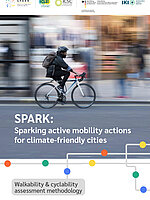SPARK - Sparking active mobility actions for climate-friendly cities
Walking and cycling are often overlooked in city planning, despite their growing importance as the most affordable, resilient, and clean form of transport. The project aims to promote active mobility strategies, policies and practices contributing to avoiding GHG emissions, improving safe connectivity in cities, and promoting climate-friendly mobility behavior. The project highlights active mobility as a priority area for cities and countries for a green recovery through model interventions re-engineering streets and open spaces, raising awareness, developing active mobility policies and recommendations, and inspiring other cities. The project strengthens the city and community-based organization capacity through “tactical urbanism”, multi-stakeholder engagement, encouraging vertical integration and national policy recommendations which will include financial considerations, developing guidelines and toolkits for easy replication and scale-up.
- Countries
- Philippines
- IKI funding
- 789,655.99 €
- Duration
- 02/2022 till 12/2025
- Status
- open
- Implementing organisation
- ICLEI - Local Governments for Sustainability e.V.
- Implementing Partner
-
- ICLEI Southeast Asia Secretariat
- Institute for Climate and Sustainable Cities (iCSC) - Philippines
State of implementation/results
- SPARK’s National Project Advisory Group (NPAG), comprised of representatives from key national government agencies, is fully operational, providing strategic guidance to ensure the project’s alignment with national policies and priorities on active mobility.
- In Quezon City, the Green Transport Division has been designated to fulfill the functions of the Non-Motorized Transport (NMT) Committee. Meanwhile, in Pasig City, efforts are underway to establish a similar body, with an Executive Order being lobbied to create a technical working group to serve as the city’s NMT Committee. These developments underscore the commitment of local governments to institutionalize support for active mobility.
- The envisioning workshops in both Quezon City and Pasig City have successfully concluded, bringing together city departments, community members, and barangay stakeholders, including also youth, persons with disabilities and senior citizens. During these workshops, participants were briefed on the SPARK Project’s objectives and the findings from the walkability and cyclability assessments. Importantly, stakeholders collaboratively identified key challenges, set priorities, and selected specific areas for intervention. This collective input has directly informed the development of initial proposals for planned interventions. The proposals are currently undergoing consultations with city offices, barangay officials, and community stakeholders to ensure they are refined and finalized in alignment with local needs and aspirations.
Latest Update:
04/2025
Project relations
Legend:
The link has been copied to the clipboard
Related Publications
-
 10/ 2024 | Tool/Open source product
10/ 2024 | Tool/Open source productSPARK: Walkability and cyclability assessment methodology
English (PDF, 2 MB)





